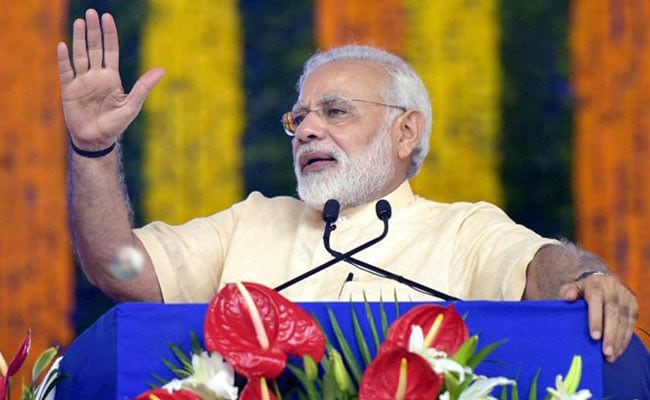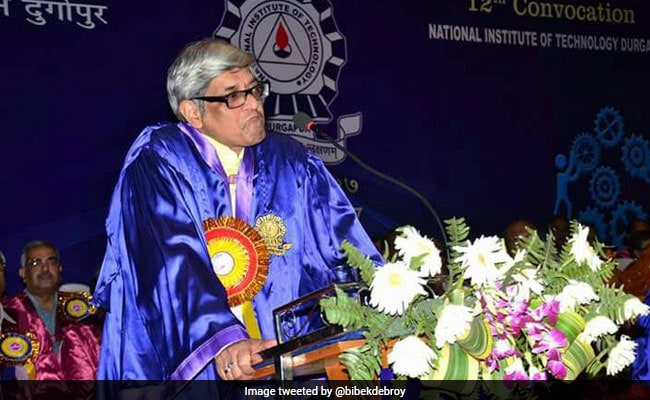Remember, India has just endured six quarters of slowing growth. Public sector banks are in crisis - a crisis that the Modi government has done too little to fix - and bank lending growth, which sustains investment and overall growth, hit historic lows recently. For a man who spoke at length in 2014 about his ability as a manager, citing Gujarat's economy as proof, this should have been a wake-up call. No amount of jibes about "hard work better than Harvard" help disguise the numbers.
Both in the 2014 election campaign, and in the years since, Modi has had to balance two narratives. The first is that he is an economic moderniser and reformer. This brought him some members of the middle class and several influential intellectuals. The second is that he is a man of the people, and will provide benefits like 50% returns for farmers. This allowed him to spread his appeal to those sections of the electorate who have not traditionally been BJP voters. It was essential to keep these narratives distinct - the "liberalisers" should be able to look away from promises made to the "populists" and vice versa. Modi was able to do this pretty effectively till Rahul Gandhi's "suit-boot sarkar" line - that had an outsize influence on policy choices thereafter, which tilted decisively towards the "populist" side of thinking, culminating in the populist absurdity that was demonetisation.
Now that growth has naturally slowed, as was inevitable, given the policy choices that Modi made, how will he balance these narratives? Can he afford to lose those middle-class voters who might actually conclude that he has done a bad job with the economy?

PM Narendra Modi has been grappling with worries of an economic slowdown
That's why the big policy push after the growth failure has been the new rural electrification scheme -- or perhaps I should say "new" rural electrification scheme, since many are puzzled as to how it differs from the various other optimistic pronouncements that the government has made about electricity since coming to power. Tens of thousands of crores have been promised to this new scheme, though we will have to wait to see for sure if this is actually new spending. But it's clear that rather than using this opportunity to declare a new push towards the kind of economic changes that would placate his middle-class supporters - who are currently incensed by his high petrol taxes - he has continued to focus, laser-like, on ensuring that rural India stays on his side.
Hasn't anyone in the middle class noticed that this is not the supposedly city-focused economic moderniser they claimed they were electing? That Modi has governed essentially like the National Advisory Council, except with fewer new ideas and better PowerPoints?
Apparently not. This is why the PM feels he can satisfy the middle class simply by announcing the formation of an economic advisory council to be headed by Bibek Debroy of the NITI Aayog. This new advisory council has some excellent members -- full disclosure, I know and respect many of them -- and if the PM actually listens to them, it will be good news. But on the strength of the first immediate signs, there's no reason to be optimistic. Weigh the announcement of another new scheme for the populists versus a simple council for the liberalisers. It does not look like the liberalisers have suddenly gotten the upper hand, or even that it is now a more equal fight.

PM Narendra Modi's Economic Advisory Council will be headed by NITI Aayog member Bibek Debroy
But the middle class is a far easier group to deal with. They won't even need to be conned; just throw a few words, a few phrases, half-promises, even a new and powerless council at them, and they will be happy. You don't have to convince them; they will convince themselves. Minimum government is just around the corner, surely. Yes, the government is focused on nothing so much as raising more taxes from the middle class in order to fund expenditure, but surely that is so that they can announce Lee Kuan Yew-style policies in their second term? Or the third, or the fourth, or whenever New Vikas Purush Yogi Adityanath takes over in Delhi?
I am happy that the PM has found five people he trusts to give him economic advice. I hope he actually consults them, and I would be delighted if he acts on their suggestions and warnings. But nothing in his career so far suggests that he will. So I think that anyone in Modi's middle-class base who sees this new council as a sign of hope is deluding himself or herself. The only way that Modi will become the Prime Minister the middle class wants is if they accept the possibility that there could vote for someone else in 2019. If the middle class says it will vote for Modi regardless of how much of a disappointment he is, why would he not continue to disappoint them?
(Mihir Swarup Sharma is a fellow at the Observer Research Foundation.)
Disclaimer: The opinions expressed within this article are the personal opinions of the author. The facts and opinions appearing in the article do not reflect the views of NDTV and NDTV does not assume any responsibility or liability for the same.


